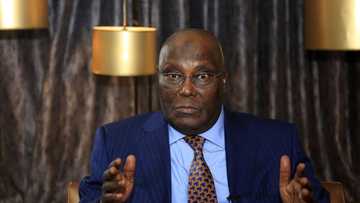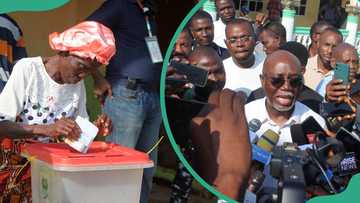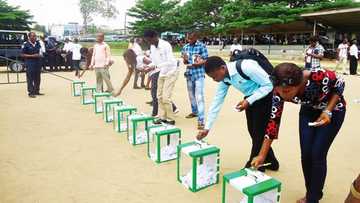Top 10 reasons for political apathy in Nigeria explained
One of the many indicators of prospering democracies is electoral participation and civic engagement in the country's political scene. However, a nation's citizens can become frustrated by numerous issues in their country and government, resulting in utter disinterest in politics. Such people then feel that there is little, if any, benefit in dedicating resources to political action. This state is known as political apathy. What are the reasons for political apathy in Nigeria today?
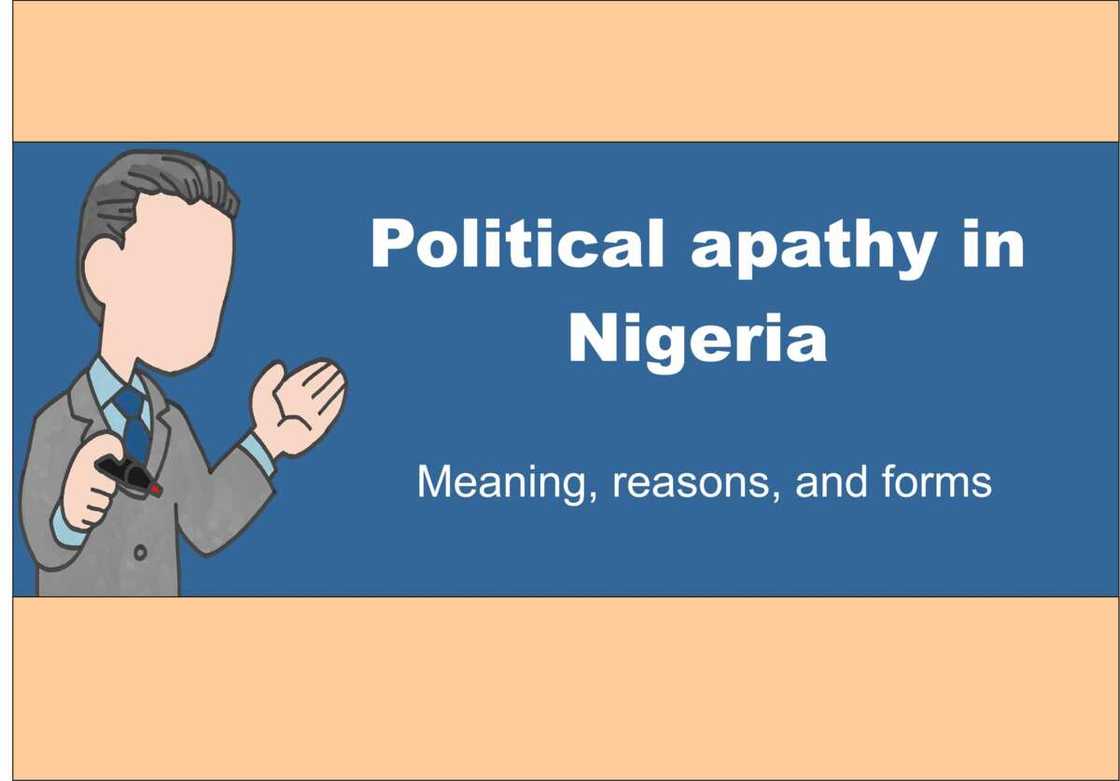
Source: UGC
Political apathy can arise from numerous reasons and has far-reaching effects on the running of a country.
What are the reasons for political apathy in Nigeria?
What is political apathy? The simplest meaning of political apathy is a lack of interest or apathy towards politics. It can consist of interest apathy, voter apathy, and information apathy. Here is a look at the ten most prominent reasons behind the current state of political apathy in Nigeria.
1. Political violence
In numerous areas across Nigeria, voters have experienced and continue to experience violence stemming from political processes. There have been several cases of voter assault by people facilitated by those seeking elective positions.
PAY ATTENTION: Subscribe to Digital Talk newsletter to receive must-know business stories and succeed BIG!
When such occurrences arise, people tend to become indifferent to politics. The simple argument is that one would rather avoid political issues since they can easily result in injury or death.
2. Lack of communication
Typically, people like to engage in processes which they feel part of. When a government does not communicate its plans and progress to the people, such people gradually lose interest in whatever the political leaders are doing.
If, for example, a government rolls out a registration exercise for a new form of ID without informing the citizens, very few people will turn up since no one feels like they are a part of the process.
3. Dishonoured promises
In Nigeria, the campaign period is characterised by numerous promises made by people seeking elective positions. Such people are then voted in with the hope that they will honour the promises they made to the citizens.
However, these promises often disappear into thin air after the elections. As a result, the next time someone comes wooing the voters, they will be quite disinterested.
4. Insecurity
For a person to actively participate in the political scene, they must be in a place where they feel secure. In the absence of security, numerous other activities take a back seat. There has been rampant insecurity in various areas across Nigeria over the years. As a result, the people in the affected areas have dissociated themselves from the country's political scene and prioritised their survival and security.
5. Coercion and bad governance
This happens when citizens feel they do not have a say in the running of the affairs that affect them. In such regimes, people feel coerced to support certain people or ideologies even when the policies associated with these individuals or ideas are bad. When this happens, most people tend to keep off the political scene since their voices will never be heard.
6. Poverty

Source: UGC
A poor person has no time, energy, or resources to engage in political matters. Instead, they will be busy looking for the means to meet their basic needs. Poverty is one of the biggest problems in Nigeria, fueled by high unemployment rates, corruption, and a weak currency. Political apathy is bound to thrive in a country where poverty is rampant.
7. Lack of education
It is said that a lack of education breeds ignorance. The Nigerian education system is currently plagued by numerous issues, including corruption, overpopulation in schools, and widespread examination malpractice.
These vices have watered down the education system, resulting in a population whose majority do not know how or when to keep the government in check. This then results in involuntary apathy that an improved education system could have alleviated.
8. Distrust
This is one of the biggest reasons for political apathy in most African countries. This reason for political apathy arises when the people have needs that they believe the government can but won't meet.
This then results in a state where the citizens do not believe that the government can act in their best interests. This is quite common in countries that have had a history of bad leadership.
9. Electoral malpractice
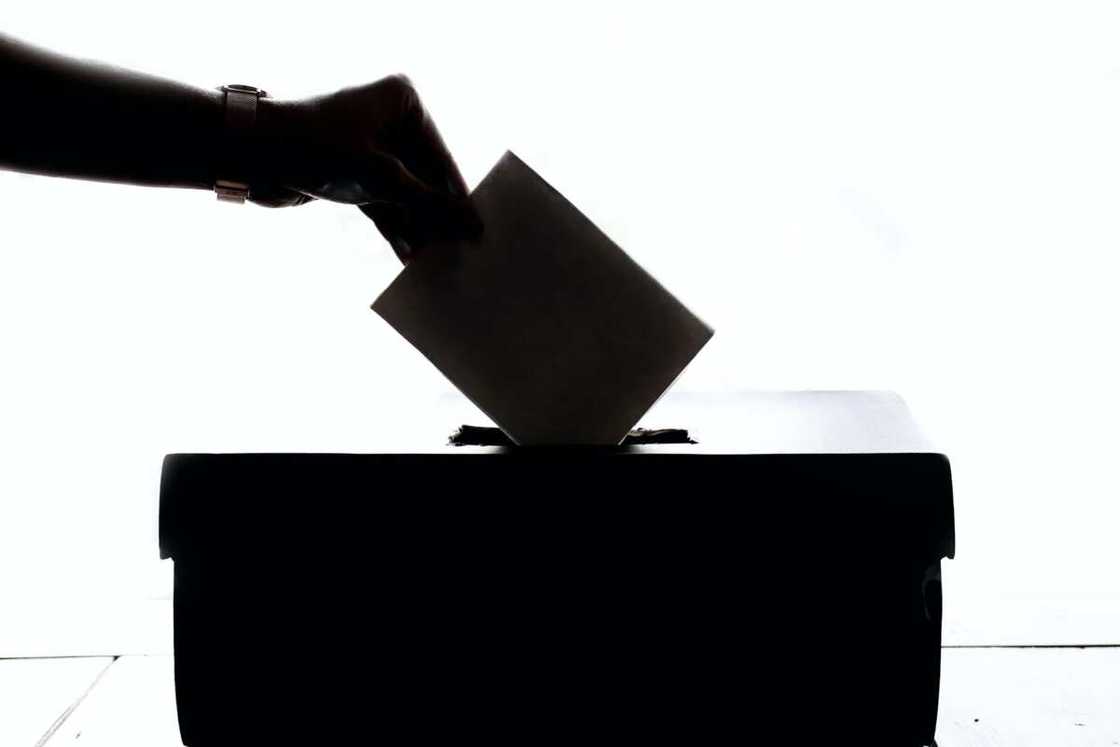
Source: UGC
Electoral malpractice is the act of manipulating election processes, materials, and results. This can take numerous forms, the most common being ballot stuffing, allowing underage voters, and voter bribing.
Nigeria's electoral system has often come under fire for numerous allegations of malpractice. This vice makes people indifferent to governance and voting. They feel that even if they were to vote, their preferences would probably be usurped by other forces in the electoral system.
10. Corruption
Corruption can be defined as a dishonest, fraudulent act done by people holding key offices or even an individual with the intention of acquiring personal gains and illicit wealth or power. When corruption becomes rampant in a country, its citizens can quickly become disinterested and indifferent to the political scene.
People feel that those in power are untouchable since they will bribe someone in an influential position and get away with their crimes.
What are the various forms of political apathy?
Here are the main forms of political apathy.
- Voter apathy: This occurs when voters do not have confidence in a country's electoral system and feel that their votes will not count in an election. Citizens think that election malpractices are prevalent and therefore do not vote in an election.
- Information apathy (indifference): This happens when citizens are not aware and do not care about government activities despite available information. They are out of touch with government initiatives and programs that might significantly impact their lives.
- Interest apathy. This one occurs when citizens are not interested in their country's politics. Such citizens do not bother about politics and how it affects their daily lives. Moreover, they are not concerned with governance, resource distribution, and leadership.
When are the next elections in Nigeria?
The next general election will be held on Saturday, 25 February 2023.
There are numerous reasons for political apathy in Nigeria, some stronger than others. The country's populace has gradually become more and more indifferent to politics, governance, and electoral systems.
READ ALSO: Types of courts in Nigeria and their functions explained
Legit.ng recently published an article about the types of courts in Nigeria and their functions. The Judiciary is one of the three arms of the Nigerian government. It is mandated to adjudicate disputes arising between individuals, governments, and corporate entities in their inter-relationships with one another within or outside the country under the law.
There are different types of courts in Nigeria, all part of the country's Judiciary. The courts exist in a hierarchical order, with those above being superior to the ones below. These bodies also have varying jurisdictions.
Source: Legit.ng

Jackline Wangare (Lifestyle writer) Jackline Simwa is a content writer at Legit.ng, where she has worked since mid-2021. She tackles diverse topics, including finance, entertainment, sports, and lifestyle. Previously, she worked at The Campanile by Kenyatta University. She has more than five years in writing. Jackline graduated with a Bachelor’s degree in Economics (2019) and a Diploma in Marketing (2015) from Kenyatta University. In 2023, Jackline finished the AFP course on Digital Investigation Techniques and Google News Initiative course in 2024. Email: simwajackie2022@gmail.com.

Adrianna Simwa (Lifestyle writer) Adrianna Simwa is a content writer at Legit.ng where she has worked since mid-2022. She has written for many periodicals on a variety of subjects, including news, celebrities, and lifestyle, for more than three years. She has worked for The Hoth, The Standard Group and Triple P Media. Adrianna graduated from Nairobi University with a Bachelor of Fine Arts (BFA) in 2020. In 2023, Simwa finished the AFP course on Digital Investigation Techniques. You can reach her through her email: adriannasimwa@gmail.com



